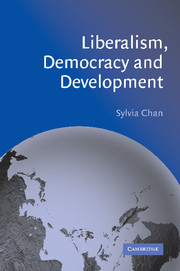Book contents
- Frontmatter
- Contents
- Acknowledgements
- List of abbreviations
- Introduction
- 1 The question: is ‘liberal democracy’ good for economic development?
- Part I The present context of democratisation and decomposing ‘liberal democracy’
- Part II The democracy–development debate: old problem, new thinking
- 4 Constructing an empirical explanation
- 5 The democracy–development debate reconsidered
- 6 Reconstructing an explanation of the Asian success
- 7 Conclusion: moving beyond the question of ‘liberal democracy’
- Bibliography
- Index
4 - Constructing an empirical explanation
Published online by Cambridge University Press: 22 September 2009
- Frontmatter
- Contents
- Acknowledgements
- List of abbreviations
- Introduction
- 1 The question: is ‘liberal democracy’ good for economic development?
- Part I The present context of democratisation and decomposing ‘liberal democracy’
- Part II The democracy–development debate: old problem, new thinking
- 4 Constructing an empirical explanation
- 5 The democracy–development debate reconsidered
- 6 Reconstructing an explanation of the Asian success
- 7 Conclusion: moving beyond the question of ‘liberal democracy’
- Bibliography
- Index
Summary
How to construct an explanation of the democracy–development connection with the Asian cases? How does this particular sub-set of cases compare with other sub-set(s) of cases? And which of the sub-issues raised in Part I can be tested by the Asian cases and which not? In choosing to tackle the democracy–development question with some theoretical rethinking and then applying and illustrating the advantages of my rethinking by taking a small sub-set of cases within the universe of democracy–development cases, I need to explain and justify my methodology. This chapter tackles this in three steps: first, it takes stock of the body of literature that analyses the democracy–development link using macro, cross-national, quantitative studies, and outlines the inadequacies involved in this line of enquiry; second, it explains how there is the need to expound the qualifications and limitations involved in constructing the type of explanations I intend to undertake; and therefore, third, it lays out how, in taking the particular cases I take, one can only examine a sub-set of the issues raised in the broader conceptual analysis in Part I of this study, how only some of the general arguments introduced in Chapter 1 can be properly tested while others have to be left aside.
Macro vs micro
First, one should not ignore that there have been many statistical studies attempting to prove either that economic development is promoted by democracy or that it is hindered by democracy and promoted by ‘authoritarianism’.
- Type
- Chapter
- Information
- Liberalism, Democracy and Development , pp. 117 - 129Publisher: Cambridge University PressPrint publication year: 2002

